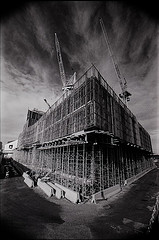Publication récente de la version 2 du manifeste pour les digital humanities (à propos de la v1 : ici). Un PDF reprend le texte, mais où on tente de le dynamiser un peu (exploitation de la surface de la page, iconographie…) — bel effort, mais ça pourrait être davantage. Passons.
Tentative de saisie du champ, qui montre bien sa bicéphalité :
Digital Humanities is not a unified field but an array of convergent practices that explore a universe in which: a) print is no longer the exclusive or the normative medium in which knowledge is produced and/or disseminated; instead, print finds itself absorbed into new, multimedia configurations; and b) digital tools, techniques, and media have altered the production and dissemination of knowledge in the arts, human and social sciences. The Digital Humanities seeks to play an inaugural role with respect to a world in which, no longer the sole producers, stewards, and disseminators of knowledge or culture, universities are called upon to shape natively digital models of scholarly discourse for the newly emergent public spheres of the present era (the www, the blogosphere, digital libraries, etc.), to model excellence and innovation in these domains, and to facilitate the formation of networks of knowledge production, exchange, and dissemination that are, at once, global and local.
Ce qui me dérange un peu dans le discours, c’est le petit côté « défenseur de la veuve et de l’orphelin » — les DH semblent intervenir sur tous les aspects où il fait bon se situer : open-source, interdisciplinarité, réinvention des approches méthodologiques, university/library without walls… Qui trop étreint, hum. Je comprends que cette perspective soit féconde, mais il serait pertinent d’identifier plus pragmatiquement les champs d’intervention, l’innovation méthodologique, plutôt que de se présenter en sauveur de la science et de la connaissance.
Proposition stimulante, néanmoins (qui fait bien ressortir l’enjeu des archives aujourd’hui, au sens le plus large possible), celle d’une interfécondité entre le curator et le scholar :
Digital Humanists recognize curation as a central feature of the future of the Humanities disciplines.
Whereas the modern university segregated scholarship from curation, demoting the latter to a secondary, supportive role, and sending curators into exile within museums, archives, and libraries, the Digital Humanities revolution promotes a fundamental reshaping of the research and teaching landscape. It recasts the scholar as curator and the curator as scholar, and, in so doing, sets out both to reinvigorate scholarly practice by means of an expanded set of possibilities and demands, and to renew the scholarly mission of museums, libraries, and archives. A university museum worthy of its name must become at least as much a laboratory as, say, a university library. An archive must become a place of teaching and hands‐on learning. The classroom must become a place of hands‐on engagement with the material remains of the past where the tasks of processing, annotating, and sequencing are integral to process of learning. Curation also has a healthy modesty: it does not insist on an ever more impossible mastery of the all; it embraces the tactility and mutability of local knowledge, and eschews disembodied Theory in favor of the nitty‐gritty of imagescapes and objecthood.
À proximité, les enjeux de recherche collaborative en SHS : un spécial Cluster de Digital Humanities Quarterly et une liste d’exemples de projets collaboratifs en SHS. De quoi s’inspirer…
 Le colloque de la Society for Digital Humanities a été pour moi l’occasion de présenter les orientations qui ont guidé la mise en place du projet DÉCALCQ et du Laboratoire Ex situ. J’ai produit une version rédigée des notes qui m’ont servi à la présentation, disponible ici ; laprojection électronique est également accessible.
Le colloque de la Society for Digital Humanities a été pour moi l’occasion de présenter les orientations qui ont guidé la mise en place du projet DÉCALCQ et du Laboratoire Ex situ. J’ai produit une version rédigée des notes qui m’ont servi à la présentation, disponible ici ; laprojection électronique est également accessible.